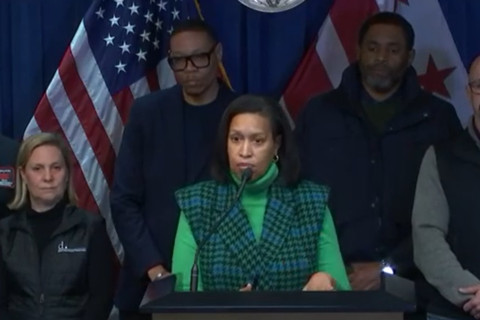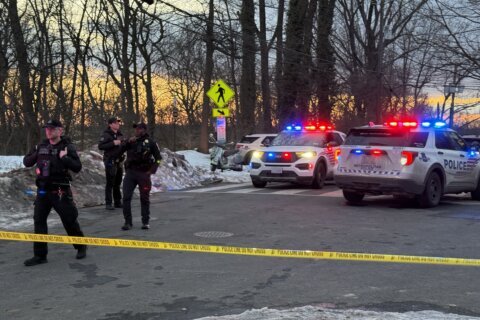D.C.’s 911 agency is in need of more people to train to take emergency calls. And its director said while they try to fill those positions — depending on what you need — texting may be a better way to get through to a dispatcher.
It’s a difficult job with long hours, and that requires a lot of training. It’s not easy to fill the many vacant positions at the Office of Unified Communications, which has come under scrutiny in recent years for delayed responses and misdirected emergency responders during life or death situations.
But while hosting Mayor Muriel Bowser at the agency’s headquarters this week, director Heather McGaffin noted that in comparison to before the pandemic, the agency is getting more calls and the nature of the calls has changed.
“The types of calls that we are taking are now requiring us to stay on the phone longer if someone’s calling with a mental health emergency,” McGaffin said at a news conference Thursday.
Adding to the challenge of longer and more frequent calls is the agency’s large number of call-taker vacancies.
“I have 28 call-taker vacancies. I have 11 dispatcher vacancies and I have 21 customer service representative vacancies at 311,” McGaffin said, noting the agency is also in need of a deputy director, training specialist and 911 operations chief.
During the event, Mayor Bowser sat at a 911 call-taker’s station to see some of the calls coming in during the day.
“They take about 3,000 911 calls every day, and about 3,100 311 calls every day,” Bowser said. “I just overheard a call about renewing an inspection. So last year, 350 employees here at OUC handled 1.3 million 911 calls and 1.6 million 311 calls. They are truly our first responders. Sometimes the calls are less urgent, but still important.”
No matter what someone is calling about, they join one queue to talk with a 911 call-taker, McGaffin said. She suggested if the call is to report an accident, gunshots, or some other issue, try texting.
“There are instances where you could text us … and you don’t have to wait in that queue. So if you’re driving by and you want to know if we know about the accident at MLK and Malcolm X [avenues], you could text us — safely — and we can let you know that we know about it, and then you’re not in the queue,” she said.
It takes a year to train someone to be a 911 dispatcher — the same group also takes non-emergency calls for 311 for things like trash pickup and other city services.
As the agency tries to hire the right individuals for the demanding job, McGaffin said they have tweaked the training procedure to make sure they can handle the 12.5-hour shifts before they begin training.
“Making sure that people can survive — that’s a survival trait to be able to work 12 hours a day or more … Then that way, if it’s not working out as far as shift work, or it’s just more than what they thought it was going to be, they have the opportunity to do something else and it hasn’t cost us thousands and thousands of dollars in training,” McGaffin.
As part of her proposed fiscal 2024 budget for public safety, the mayor included $7 million to replace radios for D.C. police, firefighters and emergency services, as well as other communication updates to connect to OUC dispatchers with each other. The mayor said there is also $2.5 million that will go toward funding Next Generation 911 technology that ensures enhanced call routing and protects against malware attacks. The budget also includes a $400,000 enhancement to upgrade 911 and 311 hardware.








